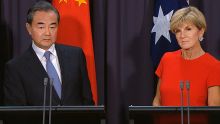A notorious parliamentary perk that gives retired politicians free business-class travel on the taxpayer will be scrapped under a new plank of Prime Minister Malcolm Turnbull's crackdown on the political entitlements system.
Special Minister of State Scott Ryan says a bill to abolish the controversial Life Gold Pass will be introduced into federal Parliament this week. The perk will be scrapped as soon as the bill passes, instead of being phased out over up to six years.
More National News Videos
MP entitlements: a systemic problem
Independent MP Andrew Wilkie wants the parliamentary entitlements system overhauled and thinks the current crop of politicians should have better judgement when claiming expenses. Courtesy ABC.
Senator Ryan has also announced that legislation to set up a new Independent Parliamentary Expenses Authority (IPEA) - promised by Mr Turnbull in the wake of the Sussan Ley expenses scandal - will be introduced be the end of the week.
Further changes recommended to the entitlements system will be rolled out over the coming months and should be in place by July 1.

"We have the opportunity to show Australians that the current generation of parliamentarians will subject themselves to higher standards than ever before," Senator Ryan said.
Opposition Leader Bill Shorten welcomed the developments but said the government must also act to clean up the political donations system.
He has flagged plans to introduce a private members bill that would dramatically reduce the donation disclosure limit, ban foreign donations, prohibit "donation splitting" and introduce increased penalties for abuse of the system.
"The time for cheap talk is over. The Prime Minister should put his money where his mouth is and back my changes," Mr Shorten said.
Senator Ryan says the government will tackle the donations system after a parliamentary committee delivers a report due in early March.
News of the Life Gold Pass decision leaked out early on Tuesday when Mr Turnbull told his MPs during a partyroom meeting the perk would go.
He was responding to questions from Coalition MPs Ian Macdonald and Warren Entsch, who wanted assurances the perk would remain under Mr Turnbull's entitlements changes. Mr Turnbull suggested their priorities were out of touch and it was important politicians lead by example in an age where many people were doing it tough.
But Mr Entsch later appeared on television to complain about the cut, arguing that while there had been abuses of the system it was a legitimate part of the retirement packages of many former members.
"Why would you cut them off and then not do it to former prime ministers?" said Mr Entsch, who was himself supposed to be eligible for the benefit.
The Coalition first promised to scrap the controversial perk nearly three years ago but the plan was put on the backburner. Late last year, the government drew fire for saying it was too busy to follow through on its pledge - even though the legislation would sail through Parliament with Labor, Greens and crossbench support.
The Life Gold Pass once offered former MPs unlimited travel at taxpayers' expense. Changes in 2002 limited that to 25 return flights a year and further changes in 2012 limited it to 10 return flights.
The Gillard government scrapped it for any MPs elected after 2012. Under Mr Turnbull's plan it will now be fully abolished for all but former prime ministers and their spouses. Mr Turnbull told the party room he personally would not use the pass.
The move comes after Mr Turnbull announced sweeping changes to the entitlements system last month in the wake of the travel scandal that brought down his then-health minister Sussan Ley.
The changes are expected to kick more than 150 former MPs off the scheme, saving taxpayers an estimated $5 million over the next four years.
Mr Turnbull's approach goes further than that proposed by former prime minister Tony Abbott, who planned to phase out the scheme over six years.
He announced his plan in the 2014 budget to show that the "age of entitlement" was over for everyone, including MPs. But after sailing through the lower house, his bill stalled in the Senate and then lapsed at the July election.
It's believed a High Court case in which four former MPs challenged the constitutionality of changes to post-Parliament payments was one of the reasons the government put the bill on the go-slow.
However, the court last year emphatically rejected the case, paving the way for its demise.
The IPEA will audit and report on parliamentarians' work expenses. It will focus on the administration and compliance of travel and related claims from parliamentarians, including ministers and their staff. It will operate as an independent statutory body.
















166 comments
Comment are now closed